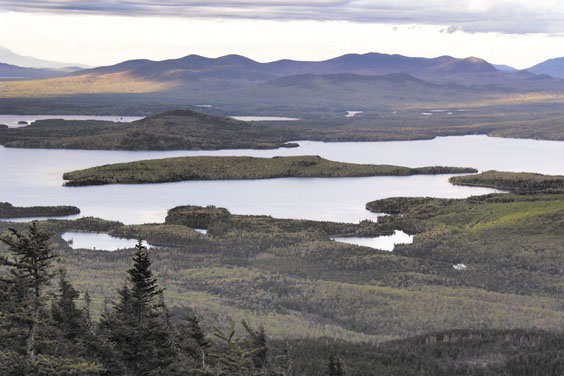PORTLAND — A state regulatory agency acted legally when it approved a massive residential development around Moosehead Lake, the supreme court ruled Thursday, giving the green light to a project that critics contend could spoil the character of the North Woods made famous by writer Henry David Thoreau.
The Land Use Regulation Commission spent four years reviewing and approving the project that delights some by conserving more than 360,000 acres but worries others with the prospect of sprawling subdivisions.
The plan limits housing development to 16,900 of the 400,000 acres, and supporters say it’s better to have a planned development with acreage set aside for conservation than willy-nilly home construction.
“We feel like the conservation outcomes are fantastic,” said Mike Tetreault, executive Director for The Nature Conservancy in Maine, which helped to negotiate the conservation provisions of the plan.
All told, the rezoning for Seattle-based Plum Creek allows for 821 house lots and two resorts with more than 1,200 housing units at Big Moose Mountain and Lily Bay. It was approved in September 2009, nearly five years after the company announced plans to rezone nearly 400,000 acres.
Critics contended the commission violated its rules by allowing the zoning plan to be amended, and a Superior Court justice agreed that the agency should have reopened the proceedings for further comment.
In a unanimous decision, the supreme court said the commission nothing wrong.
“We conclude that LURC did not violate its procedural rules and did not otherwise err by approving the rezoning petition and concept plan,” Justice Jon Levy wrote.
The commission held four weeks of hearings on the Plum Creek’s rezoning plan in December 2007 and January 2008. There were 26 parties and nearly 170 witnesses during that phase of the process. More than 400 additional witnesses testified during four full days of public hearings.
Following those hearings, the commission developed amendments to Plum Creek’s proposal based on the evidence presented during the hearings. Critics said there should have been additional public hearings to address the changes.
Environmentalists were divided, with the Natural Resources Council of Maine, Forest Ecology Network and Restore: The North Woods fighting the proposal in court, while The Nature Conservancy and the Forest Society of Maine supported the plan because of the conservation easements.
Lisa Pohlmann, executive director of the Natural Resources Council of Maine, said she still has concerns about the size and scale of the development. “It remains the largest development plan in the state’s history and there remain many concerns,” she said.
Before any construction can begin, the commission will need to issue additional permits, and Plum Creek would need customers. A Plum Creek spokeswoman noted that the economic climate has changed substantially since the development was first proposed in late 2004.
“In terms of any development plans, those are long term in nature, so we will certainly begin to look at those opportunities but we’ll have to consider the existing marketing conditions,” Plum Creek spokeswoman Kathy Budinick said from her office in Seattle.
But first, Plum Creek will close the deal with The Nature Conservancy on the conservation easements, which will be held by the Forest Society of Maine. Plum Creek will continue to own the land, but The Nature Conservancy will pay $10 million for easements that ban development and limit logging.
Attorney General William Schneider said the court’s decision is a vindication the late commission chairman Bart Harvey, who oversaw the proceedings before his death in November 2010, as well as the entire seven-member panel and hundreds of people who participated in the process.
Harvey “made it his highest priority to ensure the proceeding was transparent and scrupulously fair to all the participants,” Schneider said.
Copy the Story LinkSend questions/comments to the editors.



Success. Please wait for the page to reload. If the page does not reload within 5 seconds, please refresh the page.
Enter your email and password to access comments.
Hi, to comment on stories you must . This profile is in addition to your subscription and website login.
Already have a commenting profile? .
Invalid username/password.
Please check your email to confirm and complete your registration.
Only subscribers are eligible to post comments. Please subscribe or login first for digital access. Here’s why.
Use the form below to reset your password. When you've submitted your account email, we will send an email with a reset code.